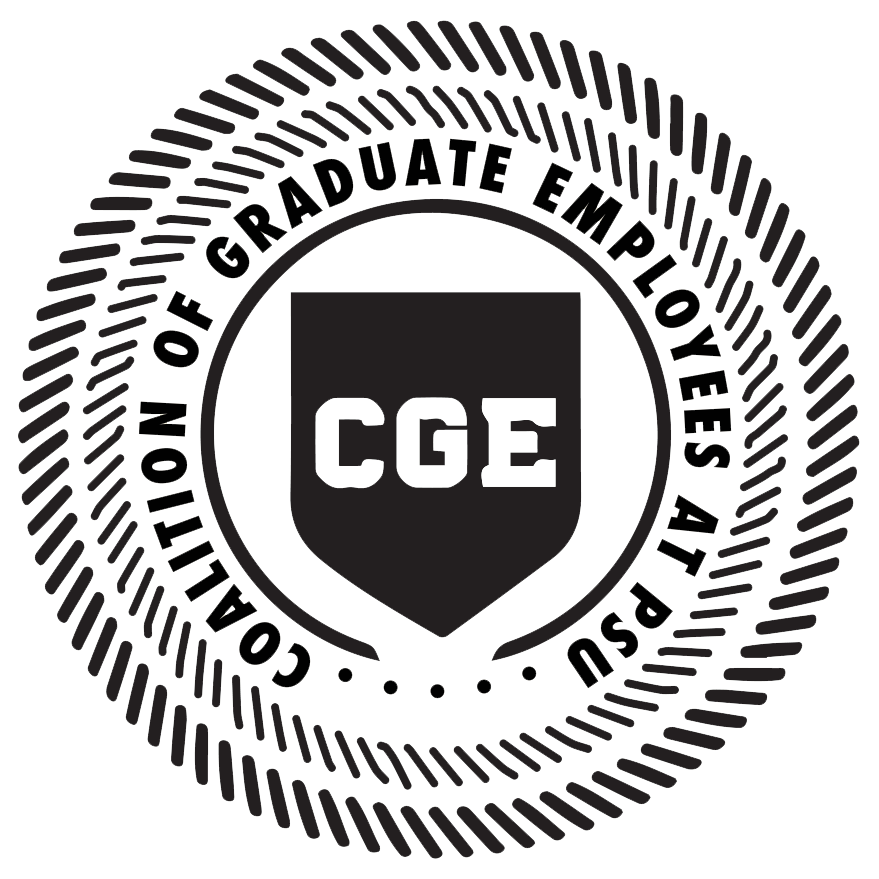Monday, April 10th is the first election date and while the campaigning is at full speed, I feel like there is still much confusion about the whole process. I decided to write this post as a student who has been interested in the subject of unionization since the beginning. Perhaps this will be of interest to those who have not been receiving any emails about the topic, or at least not as much as we (who are eligible to vote) have.
Who is this “third-party” that seeks to represent graduate students in a union?
If you are confused about who this third-party is, that’s because the emails from Penn State administration never mention this group. The organization is called The Coalition of Graduate Employees (CGE) and their website is http://cge-psu.com/

As they state on their website, they are “group of graduate assistants (GAs, TAs, and RAs) who are working towards the goal of a graduate employee union at Penn State”. Since they are in the group they seek to represent, I do not think it’s accurate to refer to them as third-party, as happened for example here.
Why would we need a union?
If you’re a graduate student, every semester you get a contract, sign it and that’s it. But what if you could negotiate what’s in the contract? Perhaps add something, perhaps remove something. Or, perhaps you think that your contract and the package of benefits that come with it (such as health insurance) was already designed with your best interests in mind. And what if you have serious issues during your graduate experience? Who will advocate for you?
Don’t we already have student organizations that advocate for us?
We do! For example, Graduate and Professional Student Association (GPSA; http://sites.psu.edu/gpsapsu/) advocates for students. However, legally speaking, their voice is advisory and not binding. Shall union be formed, union representatives would have much stronger negotiating power than other student organizations ever could.
How common is this union thing?
Quite common! Out of the 14 Universities within the Big Ten, 6 of them are unionized (Michigan State; Rutgers; University of Illinois at Urbana-Champaign; University of Iowa; University of Michigan; and University of Wisconsin at Madison). Source: http://cge-psu.com/what-is-a-graduate-union/other-graduate-unions/
For example, you can visit Michigan State union website here: http://geuatmsu.org/
What are the reasons NOT to want a union?
Graduate school has mentioned few in their emails, although to me they feel more like a campaign and less like reasons I am personally concerned about.
I do not see how a union could affect the relationship with my advisor. I talked to few students who were represented by unions before at different unis and none of them seemed to think it hurt their relationship, more often they thought they didn’t notice any effect.
I do not see how a union could limit what research outputs can or cannot be put into a thesis. I am not aware of such case and I don’t know which modification of a contract could possibly make this a real concern.
Yes, I see this as partially a goal. I do agree that teaching experience is important for students who seek to pursue an academic career. However, there is a difference between teaching experience and between being overworked and yet financially struggling. There are majors where students are expected to teach every single semester of their Ph.D. experience. There are labs where students are expected to work every weekend. There are courses where graduate students spend >30 hours each week preparing lectures, teaching, and grading, leaving little time for their research.
Are we students or are we workers?
If you keep hearing about PLRB, then note that it stands for the Pennsylvania Labor Relations Board. Penn State has challenged that graduate students perform, in fact, work for the university and argued that they shouldn’t be allowed to form a union. This has led to an official hearing in which PLRB listened to both sides: The Coalition of Graduate Employees (CGE) and the group of lawyers hired by Penn State who took the position that graduate students do not perform work, but are in fact just and only students.
I highlighted the last sentence since that’s what the witnesses talked about during the hearing. You can read the full transcripts here. If you’re interested, one of more “spicy” discussion is on page 631 of this document. I cherry-picked a teaser for you:
In March, PLRB issued the order to receive an information about eligible voters, including a list of the names, home addresses, and university email addresses.
Then we all received this news/email.
Graduate students can expect to be visited or contacted by representatives from CGE/PSEA. These representatives may make visits to graduate students’ homes, both announced and unannounced, but students have the right to decline any request to meet with them at home or on campus.
This looks like nonsense and CGE has distanced themselves from this message. To be honest, I do not understand why anyone would issue such a statement. Why would any organization of this type want to visit anyone in their home? More so unannounced? This is a mystery to me.
Anyway, the final decision of PLRB is that the graduate students are workers and allowed to form a union, which is why we have an election. That brings us to a beginning of my post.
To conclude, both parties: CGE, as well as Penn State administration, agree that you should get informed and vote. (I know I will.)
NOTE THAT THESE OPINIONS ARE MINE AND MINE ONLY. Please let me know if you find any factual inaccuracies and I’ll be happy to correct them.



